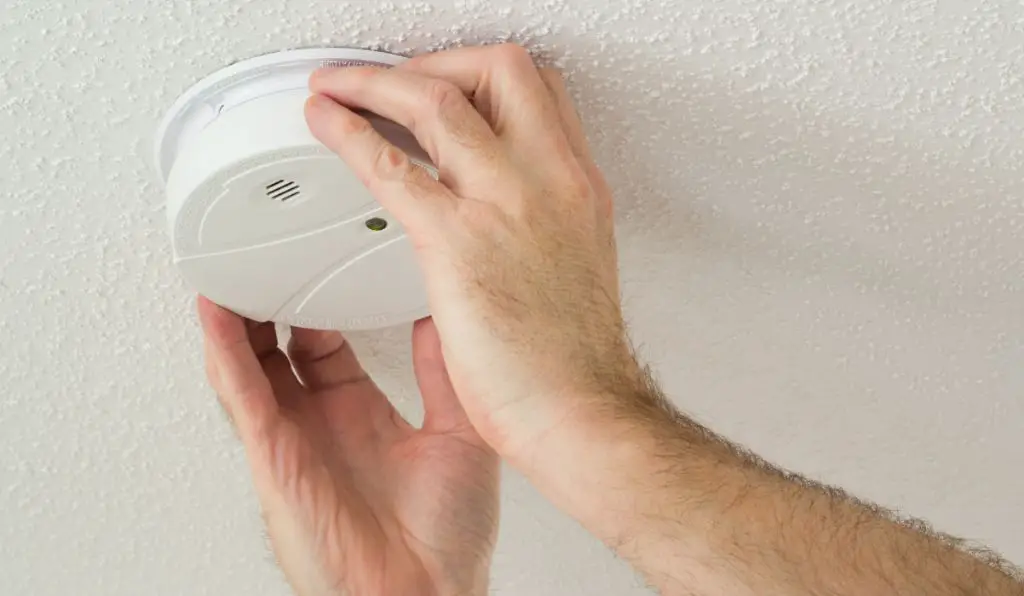Both hardwired and battery operated smoke detectors have advantages and disadvantages when it comes to providing fire protection in your home. Evaluating the key differences between the two types can help you decide which is the better option for your specific needs.
Page Contents
- 1 How do hardwired smoke detectors work?
- 2 Benefits of hardwired smoke detectors
- 3 Potential drawbacks of hardwired detectors
- 4 Key facts about battery operated smoke detectors
- 5 Benefits of battery operated detectors
- 6 Potential drawbacks of battery smoke detectors
- 7 Hardwired vs. Battery: Key Comparison
- 8 Recommendations
- 9 Conclusion
How do hardwired smoke detectors work?
Hardwired smoke detectors are powered directly by your home’s electrical system and are installed on the ceiling or wall. They have three main components:
- Smoke sensor – detects smoke particles.
- Alarm – emits a loud sound when smoke is detected.
- Power supply – provides continuous power from your home’s electrical wiring.
When smoke is detected, the alarm will sound to alert occupants of a potential fire. Hardwired alarms are interconnected, meaning if one detector senses smoke, all detectors in the system will sound.
Benefits of hardwired smoke detectors
There are several notable benefits of choosing hardwired smoke detectors:
- Reliable power source – Since they are directly wired to your home’s electrical system, there are no batteries to replace. This eliminates the risk of power failure.
- Interconnected system – With all alarms wired together, when one detector goes off, all detectors will sound to notify occupants as quickly as possible.
- No maintenance – Hardwired alarms do not require battery changes or other routine maintenance.
- Tamper resistant – It is more difficult to remove hardwired detectors, making them less vulnerable to tampering.
- Smoke detection – Hardwired models often include both ionization and photoelectric sensors for improved smoke detection.
Potential drawbacks of hardwired detectors
While hardwired smoke detectors have considerable advantages, there are also some potential downsides to consider:
- More difficult and expensive installation since wiring is required.
- Professional electrician usually required for initial setup.
- May require rewiring if you move detectors or alter home electrical system.
- While rare, damage to home wiring could disrupt power supply.
- Require more meticulous maintenance if dust or insects cause false alarms.
Key facts about battery operated smoke detectors
Now let’s take a look at how battery operated smoke detectors work and key features:
- Self-contained unit with integrated battery power supply.
- Typically mounts on ceiling or wall with screws or adhesive.
- Has smoke sensing technology that triggers loud alarm when smoke is detected.
- Most models use 9V or AA batteries that provide power for 6 months to 10 years.
- Batteries require replacement when they run down.
- Alarms are not interconnected like hardwired models.
Benefits of battery operated detectors
Here are some of the major advantages battery powered smoke detectors provide:
- Easy installation – Can be installed using adhesive or screws without wiring required.
- Portability – Battery models can be easily moved and reinstalled as needed.
- Minimal maintenance – Aside from occasional battery replacement, little maintenance needed.
- Inexpensive – Purchase and installation costs are lower compared to hardwired models.
- Good for rentals – Tenants can install without making permanent modifications.
- Independent function – Alarms work independently and are not affected by other detectors.
Potential drawbacks of battery smoke detectors
While convenient and affordable, there are some downsides to keep in mind with battery operated smoke detectors:
- Batteries may fail if not replaced regularly.
- Responsibility falls on owner to check batteries and replace when needed.
- Alarms are not interconnected like hardwired models.
- More vulnerable to tampering since models are easily removed.
- Typically contain either ionization or photoelectric sensor, but not both.
Hardwired vs. Battery: Key Comparison
To summarize the main differences, here is a comparison of key features between hardwired and battery operated smoke detectors:
| Feature | Hardwired | Battery |
|---|---|---|
| Power Source | Home electrical wiring | Contained battery |
| Installation | Requires wiring by electrician | Self-installed with adhesive/screws |
| Maintenance | Minimal | Replace batteries |
| Interconnected | Yes | No |
| Tamper resistance | High | Moderate |
| Smoke detection | Photoelectric and ionization | Typically one or the other |
| Cost | Higher purchase/installation cost | Lower purchase cost |
Recommendations
Based on the comparison, here are some recommendations on which type of smoke detector may be better for specific home scenarios:
- New construction – Hardwired is recommended for new homes where wiring installation is easier.
- Existing homes – Battery models are likely the simpler, more cost-effective option for retrofitting existing homes.
- Rentals – Battery operated models are best for rental properties since tenants can install without modifications.
- Interconnected system – Hardwired detectors are preferable if you want alarms that all sound together when triggered.
- Minimal maintenance – Hardwired models require little ongoing maintenance compared to battery replacement.
- Budget conscious – Battery powered models are most affordable purchase and installation option.
Conclusion
Hardwired and battery operated smoke detectors both have distinct advantages. Hardwired models provide interconnected alarm systems and reliable, maintenance-free power delivery. Battery models are more flexible, affordable and easier to install. For new construction or a robust interconnected system, hardwired detectors are generally the best option. Battery power suits homes where easy installation and low cost are higher priorities. Whichever type you choose, having working smoke alarms installed properly is essential to maximize fire safety.
